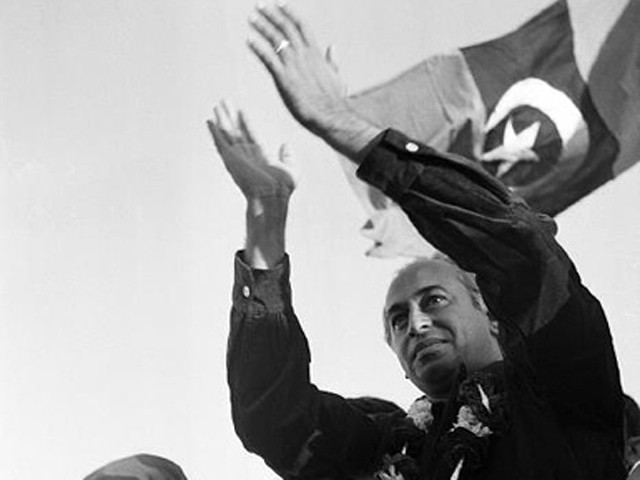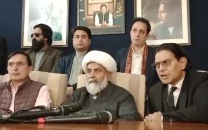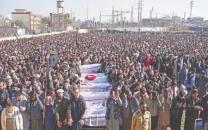Grandchildren decry Bhutto's unjust trial
Fatima Bhutto, ZAB Junior submit statement in SC

Two grandchildren of former prime minister Zulfikar Ali Bhutto (ZAB) have contended that the trial in their grandfather’s case was a grave miscarriage of justice and in violation of basic constitutional guarantees of a citizen to “be dealt in accordance with the law”.
Fatima Bhutto and Zulfikar Ali Bhutto Junior—children of Bhutto’s elder son Murtaza Bhutto—have said that in a written statement submitted to the Supreme Court through their counsel Zahid F Ebrahim.
A nine-member SC bench led by Chief Justice of Pakistan (CJ) Qazi Faez Isa is hearing a presidential reference seeking revisiting of the ZAB case.
The Lahore High Court (LHC) sentenced the former prime minister to death on March 18, 1978 for ordering assassination of Ahmed Reza Kasuri. The Supreme Court upheld the LHC verdict with a majority vote of 4 to 3 on February 6, 1979. The PPP founder was executed on April 4 of the same year.
Referring to the LHC verdict, the statement referred to the “unchallenged revelations” made by former CJ Justice Nasim Hasan Shah—who was among the judges who voted in favor of the LHC order—who admitted that the LHC chief justice then had a personal enmity against ZAB.
“It is plainly evident that the decision of the LHC was led by a chief justice whose hatred for Mr Bhutto was recognized by no less than Dr Justice Nasim Hasan Shah himself and the Supreme Court Judgment in the Bhutto Trial was a grave miscarriage of justice and thus in violation of basic Constitutional guarantees of a citizen to be dealt in accordance with the law.”
The statement also stated that there is now no doubt that an elected prime minister of Pakistan was overthrown in a military coup and a farcical judicial trial was orchestrated for no other reason but to murder Bhutto and to perpetuate a dictatorship.
“After all, how else can one read the speech of 5.7.77 of General Ziaul Haq who pledged that ‘I was obliged to step in to fill in the vacuum created by political leaders. I have accepted this challenge as a true soldier of Islam. My sole aim is to organize free and fair elections which will be held in October this year. Soon after the polls, power will be transferred to the elected representatives of the people’”.
The statement said it is never too late to right a wrong. In fact, it said, we will always be a prisoner to our crimes if we do not correct what we now know as plain miscarriage of justice.
“Therefore, it is humbly prayed that the Presidential Reference on the question as to whether the decision of the LHC as well as the Supreme Court of Pakistan in the murder trial against Shaheed Zulfikar Ali Bhutto meets the requirements of fundamental rights as guaranteed under Article 4, sub Articles (1) & (2)(a), Article 8, Article 9, Article 10A due process, Article 14, Article 25 of the Constitution of the Islamic Republic of Pakistan, 1973 must be answered in the negative.”
It said Ahmed Reza Kasuri was a founder member of the PPP and was elected as an MNA on a PPP ticket in 1970. He, however, soon developed differences with Bhutto and joined the Tehreek-e-Istiqlal party.
“On 11.11.1974, Mr Ahmed Reza Kasuri lodged FIR No. 402/1974 within hours of the murderous attack which led to the unfortunate death of his father late Nawab Ahmed Khan.
“In the FIR, he expressed his suspicion that because he had remained the most virulent critic of the person and policies of ZAB the attack had been made on him due to political reasons.
“Yet, in less than two years of lodging the FIR, in April 1976, Mr Ahmed Reza Kasuri rejoined the PPP.
“He continued to remain a member of and attended the meetings of Tehrik-i-Fikr-i-Quaid-e-Awam, an organization meant for propagating the political philosophy of Bhutto until April 1977. Mr Ahmed Reza Kasuri even applied for the PPP ticket to contest the general elections of 1977 but was denied.
“The same Mr Ahmed Reza Kasuri who waxed eloquence on the person of Bhutto until a few months earlier, became the lead prosecution witness against Mr Bhutto as soon as General Ziaul Haq proclaimed Martial Law on 5.7.1977 and trial was entrusted in the hands of [LHC] Chief Justice Mushtaq Hussain.”
The statement said Article 189 establishes that any decision of the SC achieves finality.
However, the reference under Article 186, requires the SC to render an opinion after analyzing and evaluating the apex court’s and the LHC judgments in the ZAB case on the touchstone of fundamental rights guaranteed under the Constitution.
“The answering of questions in this reference will not affect the decision or the ratio decided in these judgments, but a plenary opinion thereon is a debt to our constitutional history which must be repaid”
Former attorney general for Pakistan (AGP) Khalid Jawed Khan who is an amicus in this case said in view of the jurisdiction conferred on the SC under Article 186, the conviction and sentence passed against Bhutto may not be quashed, annulled or set aside.
The Supreme Court, however, may address the question of law and give opinion that in the light of the facts and prevailing circumstances and the personal enmity of the military dictator, the trial, conviction and sentence of Bhutto does not meet the constitutional requirements and due process of law.
He said the issue of wrongful convictions and miscarriage of justice has been addressed in many countries through enactment of specific legislation.
“In accordance with statutory provisions, convictions have been posthumously annulled, set aside and declarations of innocence, exonerations or pardons made in various jurisdictions,” he said.



















COMMENTS
Comments are moderated and generally will be posted if they are on-topic and not abusive.
For more information, please see our Comments FAQ